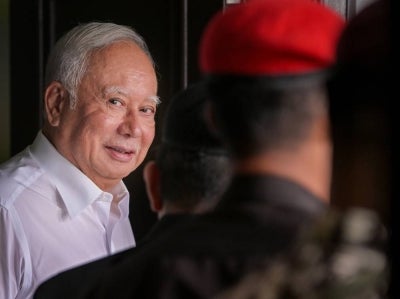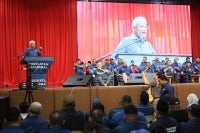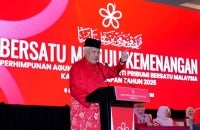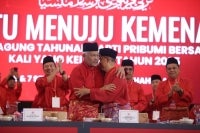Lekir 'black gold' rescues fishermen from life of poverty

MANJUNG - At the ungodly hour of 3am, Mohd Salleh Yunus is already up and all set to get to his cockle farm located in the waters of the Strait of Malacca off the Lekir Valley here.
He gets into his boat and heads for his farm which he operates with seven other fishermen, equipped with just a lift net attached to a pole which he uses to scoop up the cockles - considered as "black gold” by the fishing community.
The farm is a mere five-minute boat ride from the Kuala Kayan jetty but the 57-year-old fisherman is in a hurry to get there as he has to get his work done before sunrise and the high tide begins to recede.
The father-of-six told Bernama life was hard for him before he ventured into cockle farming, adding that his family lived a hand-to-mouth existence then because as a fisherman he only managed to earn at the most RM1,000 a month.
Life, however, is much better these days.
"Each month, I can make a net income of about RM2,800 from selling the cockles harvested at my farm without having to go to the sea to catch fish,” the sun-tanned man declared, smiling.
Opened three years ago, the 21-hectare cockle farm is part of the Kebun Kerang Lekir (Lekir Cockle Farm) project overseen by the Perak Fisheries Department. The entire project has 25 cockle farming lots, one of which is headed by Mohd Salleh. Each lot is operated by eight fishermen.
Using the skills he had acquired from his 25 years as a fisherman, Mohd Salleh, together with his partners, are able to harvest some two metric tonnes of cockles each time they set out to scoop up the molluscs from the seawater at their farm.
According to him, hauling up the farmed cockles is far from an easy task as the lift net they use can only scoop up a certain amount.
He also said his harvests are sold out in no time as there is always good demand for cockles in his locality.
"Selling them is not a problem for me. Wholesalers and restaurant owners come to the jetty as early as 8am to buy our cockles. This is why I’ve to go to my farm to harvest the cockles very early in the morning before the low tide sets in,” he said, adding that he sells his catch at, depending on the demand, RM8 a kilogramme.
Mohd Salleh, who was born and raised in Teluk Intan, Perak, was introduced to cockle farming in 2020 after he joined the Perak Fisheries Department’s Kebun Kerang Lekir project, a cockle breeding and farming project.
The project is aimed at improving the incomes and standard of living of the B40 fishermen in the area and is part of the Lekir Food Valley plan involving an area equivalent to 4,538 hectares in the waters off the Lekir Valley.
Mohd Salleh said he ventured into cockle farming with the training, equipment and assistance provided by the Perak Fisheries Department.
During the training, conducted over one to three days, the participants are taught how to collect, grade and clean the cockles.
"I certainly have no regrets... I am now able to breed (and harvest) cockles in a systematic way... it has provided me with a stable and regular income stream.
"In the past, my income was unpredictable as it would depend on the fish I catch. Sometimes I would earn more if I am able to collect cockle seeds at the sea edges (on the beach)... my income was less when there were no seeds. But I am better off now after participating in the (Kebun Kerang Lekir) project,” he said.
Another person who has benefited from the project is coastal fisherman and prawn rearer Mohamad Mohamed Idris, 48, who heads one of the cockle farming lots on the project site and makes about RM7,000 a month.
"Not only did the (Fisheries) department equip us with the knowledge to produce cockles but also provided us with the necessary facilities. For example, our previously small and rickety jetty has been upgraded and now comes complete with a cockle grader and icebox,” he said, adding that youths from nearby villages are also involved in the cockle farming project.
Meanwhile, commenting on the Kebun Kerang Lekir project, Perak Fisheries Department deputy director Albert Apollo Chan said it is among the biggest in the country and generates enough cockles to meet more than 50 percent of Peninsular Malaysia’s requirements.
"Besides conducting courses for them, the (project) participants are also issued licences to breed and collect cockle seeds. We also provide them with equipment (approved for cockle breeding) for as long as they operate the farms,” he said, adding that each lot, if operated consistently and in accordance with the prescribed procedures, can yield an income of up to a million ringgit a year.
According to Chan, the Kebun Kerang Lekir project has benefited the area’s coastal fishermen, many of whom used to face erratic incomes, especially during the monsoon season when they could not go out to the sea.
The waters off the Lekir Valley are among the best sites in the country for the cultivation of high-quality cockle seeds and breeding of premium-grade cockles. Thanks to its conducive water quality and temperature, the cockles produced here can reach a size of up to 45 millimetres in width.
In 2022, the Kebun Kerang Lekir project generated 322 metric tonnes of cockles valued at RM3.7 million. In 2021, it generated 499 metric tonnes of cockle seeds valued at RM11.5 million. Its highest-ever output of cockle seeds - 1,202 metric tonnes - was recorded in 2020. - BERNAMA
Download Sinar Daily application.Click Here!














